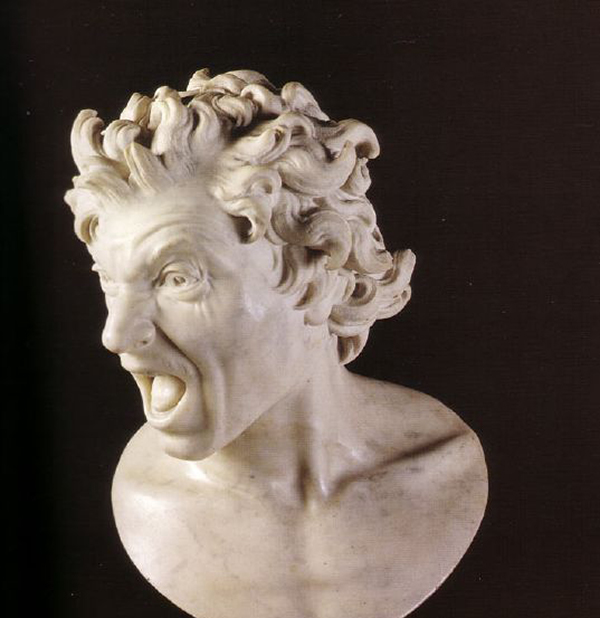Untimely Reflections on 'Hate'
- ROBERT ROYAL
It's never easy to bring unwelcome truths into the public realm.
 Damned Soul by Gian Lorenzo Bernini, CC BY 2.0
Damned Soul by Gian Lorenzo Bernini, CC BY 2.0
And it's become increasingly difficult, for obvious reasons, since the advent of the Internet—to say nothing of the deep divisions we face at the start of this crazed election year. Or equally deep divisions in the Church. So, what light and steadiness can we possibly find at a moment like this in our untimely, ancient Catholic Faith?
To start, I'd suggest resisting something truly toxic that's been little noticed: letting public and private polarization—even over matters as transitory as mere policy differences—turn into "hate." We just observed Martin Luther King Day and there are many things about that pivotal American worth recalling in our time, perhaps nothing more urgent, however, than his warning: "Don't let them get you to hate them."
Crucial spiritual advice. A lot of people, whom you might expect would admire Dr. King, claim to find "hate" everywhere: "hate speech," "preaching hate," "hating women," "hating blacks," "hating LGBT." These are clever rhetorical tropes intended to hide their own thinly disguised "hatred" towards: Christianity, pro-lifers, opponents of LGBT ideology, or of "anti-racist" racism, and much more.
Still, we have to be constantly alert to the temptation to embrace "hatred" ourselves, even as we seek to counteract evil and promote goodness and truth. The term hatred, as it's commonly used these days, banishes the other into the outer darkness as damnably evil. King knew that even when you're facing monstrous evils, such hatreds might themselves become mortal sins. That it's possible to turn yourself into the very kind of people you "hate" unless you stand careful watch over your own soul.
There is—or at least ought to be—a clear distinction, among Christians and other people of goodwill, between hatred and anger. St. Thomas Aquinas, who knew a few truths about the human soul, wrote: "evil may be found in anger, when, to wit, one is angry, more or less than right reason demands. But if one is angry in accordance with right reason, one's anger is deserving of praise." (ST IIa IIae q.158 a.1)
In other words, there is "righteous anger," an anger proportionate to the evils that we must try to correct, not hide from or ignore. But there are good and bad ways to do so. A proper, righteous anger is, in its way, a form of love.
By contrast, there is no "righteous hatred"—if by hatred we mean essentially that we wish someone dead—and "damned to Hell."
In our post-Christian society, there's, unfortunately, a lot of that around, even in the Church. And it's the result of our failures to recognize our own sins and imperfections, need for forgiveness, and the unavoidable task of bearing one another's burdens. In other words, the pursuit of an earthly Utopia that never was and never will be. A Christian heresy.
Cardinal George Pell, who passed away just a year ago, wrote—after months of unjust imprisonment—in his Prison Journals:
When feelings run deep, it is especially useful to strive to remain calm and wise and to resist the temptations of uncharity, to hate. St. Thomas More's prayer to resist temptation is helpful. "Almighty God, assist me with your gracious help so that to the subtle suggestions of the serpent I never so incline the ears of my heart but that my reason may resist them and master my sensuality and keep me from them." [Italic added.]
A lot of people who have not had a very deep Christian formation haven't learned such subtle crucial distinctions between anger and hate. Those who know the difference in theory find how difficult it is to practice. But it can be done. When I was writing my book on the modern martyrs, one of the things that always struck me is how they often died—like Jesus—not cursing but praying for their executioners. That kind of charity cannot be faked.
Outside of Christianity, however, the desire for calm and wisdom—and avoidance of hate—can mean something else than what Pell and More and we ourselves should think of as peace of soul through trusting in God.
Ancient philosophers (especially the Stoics, who have been making something of a comeback these days among troubled non-Christians) often spoke of a state of ataraxia, seeking to remain untroubled by things going on around you—a very wise habit to cultivate when the political world is very much troubled—both then and now.
But such cultivation of calmness is merely a psychological state, or at best a philosophical detachment, more adapted to passive endurance, not as in Christianity, a life dedicated to the good and the true, quietly if possible, but not counting the cost when necessary.
The very best pagans knew that indulging the wrong kind of anger was not only destructive of society but of your own soul. The Stoics used to say that anger is a kind of "temporary madness." Seneca, a Stoic so powerful he seems to have influenced even St. Paul, wrote a highly popular play called "The Madness of Hercules" Hercules furens, showing how one of the great heroes of ancient mythology—went into a delusional anger, and killed his own wife and children. (Our friend and sometime contributor, poet Dana Gioia has translated the play and written an insightful commentary on Stoicism.)
But outside of Christianity, avoiding anger more often means the search for passivity rather than charity.
In this anno Domini 2024, we've got large struggles ahead of us both in the Church and the public square. We cannot do otherwise than engage in those struggles; they're the challenges that God has chosen us to face by putting us in this time and place.
But we face a double challenge, an external struggle to make the world better founded upon what's true and right. And an internal struggle to keep anger, from turning into hate, perhaps as never before, a subtle temptation and mortal sin all its own.
 This is Meaghen Gonzalez, Editor of CERC. I hope you appreciated this piece. We curate these articles especially for believers like you.
This is Meaghen Gonzalez, Editor of CERC. I hope you appreciated this piece. We curate these articles especially for believers like you.
Please show your appreciation by making a $3 donation. CERC is entirely reader supported.

Acknowledgement
 Robert Royal. "Untimely Reflections on 'Hate'." The Catholic Thing (January 22, 2024).
Robert Royal. "Untimely Reflections on 'Hate'." The Catholic Thing (January 22, 2024).
Reprinted with permission from The Catholic Thing.
The Author

 Robert Royal is the founder and president of the Faith & Reason Institute in Washington, D.C. and editor-in-chief of The Catholic Thing. His books include: 1492 And All That: Political Manipulations of History, Reinventing the American People: Unity and Diversity Today, The Virgin and the Dynamo: The Use and Abuse of Religion in the Environment Debate, Dante Alighieri in the Spiritual Legacy Series, The Catholic Martyrs of the Twentieth Century: A Comprehensive Global History, The Pope's Army, and The God That Did Not Fail. Dr. Royal holds a B.A. and M.A. from Brown University and a Ph.D. in Comparative Literature from the Catholic University of America. He has taught at Brown University, Rhode Island College, and The Catholic University of America. He received fellowships to study in Italy from the Renaissance Society of America (1977) and as a Fulbright scholar (1978). From 1980 to 1982, he served as editor-in-chief of Prospect magazine in Princeton, New Jersey.
Robert Royal is the founder and president of the Faith & Reason Institute in Washington, D.C. and editor-in-chief of The Catholic Thing. His books include: 1492 And All That: Political Manipulations of History, Reinventing the American People: Unity and Diversity Today, The Virgin and the Dynamo: The Use and Abuse of Religion in the Environment Debate, Dante Alighieri in the Spiritual Legacy Series, The Catholic Martyrs of the Twentieth Century: A Comprehensive Global History, The Pope's Army, and The God That Did Not Fail. Dr. Royal holds a B.A. and M.A. from Brown University and a Ph.D. in Comparative Literature from the Catholic University of America. He has taught at Brown University, Rhode Island College, and The Catholic University of America. He received fellowships to study in Italy from the Renaissance Society of America (1977) and as a Fulbright scholar (1978). From 1980 to 1982, he served as editor-in-chief of Prospect magazine in Princeton, New Jersey.




